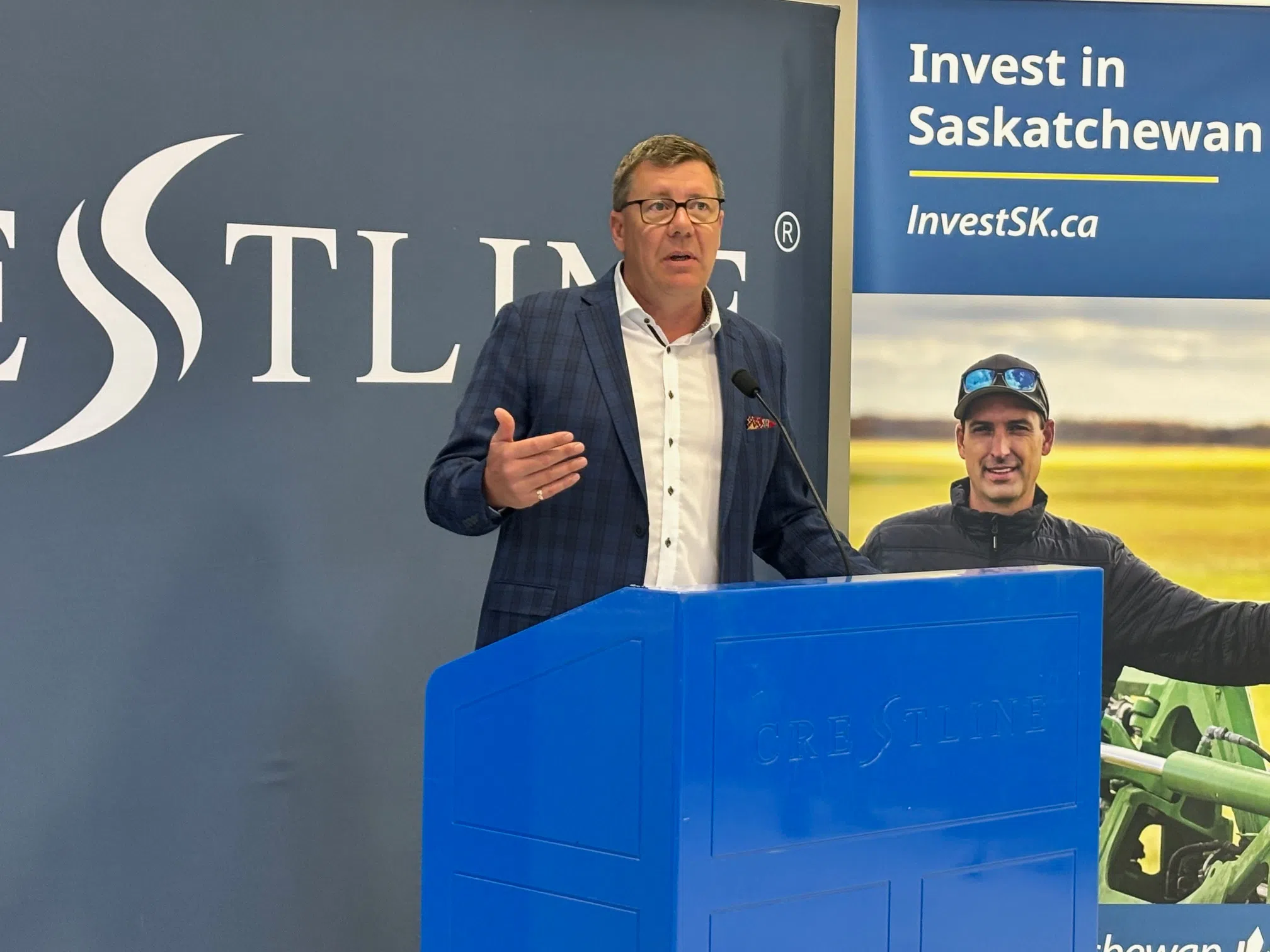As Saskatchewan continues to face a demanding wildfire season, rising tariffs, health care pressures and the ongoing need to support local industries, Premier Scott Moe appeared on the Evan Bray Show on Friday morning. He discussed his call for a new interprovincial trade agreement and other major challenges facing the province.
Moe noted the delicate balance between the steel and agriculture sectors, acknowledging the federal government’s recent decision to impose steel tariffs and quotas aimed at supporting the struggling industry. While he expressed understanding the move, Moe said he is concerned about possible international retaliation and how it could affect Saskatchewan.
He also addressed internal issues, including ongoing communication problems with the RCMP following the recent removal of Saskatchewan RCMP Assistant Commissioner Rhonda Blackmore.
Listen to the interview with Premier Scott Moe here:
This transcript has been edited and condensed for clarity.
EVAN BRAY: We saw Mark Carney come out this week with some strongly worded policies with regard to providing support to the steel industry. We’ve seen similar in the auto industry. Does it feel as though we don’t see the same strength from the federal government with regard to the canola tariffs from China?
MOE: There’s a fine line to walk here, and I understand the response with respect to the steel industry and even other industries that add value to our Canadian economy, but few of them had as much value as the ag industry or the value added ag industry, and few of them are as globally connected as the ag industry is. And so we’re very nervous about what any response might be to yesterday’s increased action on a number of countries, including China, with steel and aluminum. I’ll be seeing Prime Minister Carney Tuesday, already reached out to ministers in his office, because although we understand the line he’s trying to walk in really aligning with U.S. trade interests when it comes to the world, we cannot in any way sacrifice the ag industry, in particular the canola industry, and we’ve already felt the brunt of that with the first round of steel and aluminum and EV tariffs.
BRAY: Have you felt that the Prime Minister has moved on your request? I know they’ve reached out and had a conversation with China, but it just doesn’t seem like it’s getting the same attention as the whole canola tariff topic.
MOE: He is engaging, and he has engaged up to the prime minister level, and I would hope that there’s a meeting with President Xi shortly for not just agriculture, but the broader relationship with China and the opportunities that we have with China. If we’re going to expand trade in any way beyond the U.S., Saskatchewan is the poster province for how to do that.
BRAY: What is your hope, your focus, your priority going into the Council of the Federation meetings next week?
MOE: Three things, and I announced one yesterday. If we’re serious about internal trade, the next logical step is for all provinces to sign on to the foremost interprovincial trade agreement, which is the New West Partnership, which is the western provinces, and extend that across the nation. Second, discussions around Bill C5 and projects, and more importantly, the fact that the necessity of Bill C5 is really there to circumvent the very flawed regulatory approval process that we have for mines, oil and gas investments, and even ag value-added investments, so we need to fix the regulatory process. Bill C5 is nothing more than a stopgap. And last but not least, we always need to look for opportunities to get our products to market. That’s why that port-to-port infrastructure or corridor — that would open up Asian and European markets — needs to stay at the forefront of the federal government and provincial premiers as well.
BRAY: What do you see the New West Partnership bringing to Saskatchewan in practical terms, if there’s some success in getting other provinces to sign on with the West?
MOE: Enhanced opportunities to sell some of our products in other parts of Canada, but also enhanced opportunities for us as we build mine sites and value-added canola crush plants, and such, to access additional Canadian products. If we’re serious about buying Canada — and I won’t use the term elbows up — We need to actually be serious about how we’re moving those products across Canada.
BRAY: You’ve been quite vocal through the years on the need for change to equalization payments in Canada. Is that a topic you’ve had the opportunity to speak with the new Prime Minister about?
MOE: Not in any depth at this point, but it is a topic that’s going to keep reoccurring and coming up at leaders’ tables until that formula is ultimately changed. The formula is outdated, it’s flawed, and it doesn’t include things like hydroelectricity that are significant sources of revenue for places like Newfoundland, Labrador, Quebec, and even Manitoba and British Columbia. When you look at those provinces, Manitoba and Quebec are large receivers of equalization payments, yet they have significant revenue that’s being generated that isn’t part of the formula, so it’s a flawed formula, and it does need to change. I don’t know when that’s going to be, but we’ll always align and push with provinces for that change.
BRAY: We’re just hearing now that less than a year after we heard construction was ahead of schedule for BHP at the Jansen potash project, it now looks like it’s going to face a fairly significant delay. There’s a cost increase. Is that concerning to you?
MOE: There is a cost increase, which I don’t think would be surprising, and I doubt whether it’s surprising to the market. If the schools and the hospitals, the public infrastructure that we’re building, we’ve seen significant cost increases in the last half a dozen years or so. It’s no surprise that privately funded infrastructure, like a mine site, is seeing the same thing that BHP is back to is their original open date and their original production date on phase one. So it isn’t that far out of line with where they started, as they try to manage the private sector with what is a publicly traded company, the cost pressures that not only they’re seeing, but everyone is seeing.
BRAY: Alberta Premier Danielle Smith just talked about this past week in a town hall about the fact that supply management is something to think about — whether or not Alberta wants to step away from that — is that something you’ve ever been in talks about in our province?
MOE: No, but it is going to be coming to the conversation, and maybe even next week with the Prime Minister, with the removal of digital service tax at the President’s request, and as we are now adventuring into expanding on our CUSMA agreement. I’m almost certain that supply management is going to be the next point of contention, so the federal government is going to have to seriously look at whether they are going to put supply management on the table to negotiate. They said they wouldn’t, thus far. But as we get into the larger conversation around expanding that CUSMA agreement with what is our largest trading partner, they may not have a choice.
BRAY: On the wildfire situation, do you think there are things that you would do differently next year?
MOE: I think there are things we need to look at with respect to the resources that we have. This year was particularly bad with respect to how intense the fires were and how they simply couldn’t be stopped before they entered some communities. First, just a credit to our municipal fire departments, the structural guys that are saving communities today. But with respect to some of the ground trailer resources that we have, we’ve ordered four new planes. We’re looking at the capacity we have in here, but also the capacity we have on the ground, with respect to the sprinklers that we have for those municipal communities to use to keep their communities wet when the fire gets there, I think that is some of that capacity we need to look at. What we’re doing right now is still engaging with over 50 fires, some of them encroaching on communities, yet today, but supporting some of the devastation and people and communities that have lost their homes, which is far greater this year than it has been in other years.
BRAY: Can I get your thoughts on the removal of Assistant Commissioner Rhonda Blackmore as the head of the Saskatchewan RCMP? How was it done? What was the communication like with the province?
MOE: Communication was, and remains, not very good, I would say, from the RCMP and even those entities around the RCMP, and it’s pretty frustrating, actually, in what we saw as a government. What I saw in Rhonda Blackmore as a leader of the RCMP, was someone that was collaborative, not only with us as a provincial government, but with the the RCMP members and it was making — I think — some pretty significant steps in supporting members by expanding the opportunities for recruitment of members to the province, keeping them in the province and really pushing the numbers of RCMP that we have at our local detachments up, and that’s really what we need. We’re short enforcement officers, like even at the municipal level — and your background, Evan — Rhonda was providing tremendous leadership to the RCMP organization in Saskatchewan.
We were quite happy and actually very pleased with the leadership that she was providing, and so it’s puzzling that she was removed. It’s frustrating, I think, to some degree, because we’re concerned that maybe some of the strides that were being made and the positive steps that were being taken may not continue. I hope they will, but the communication has not been great. So a little bit of a frustrating situation. I see they’re now doing an investigation. The RCMP is going to investigate itself and how it came to this decision. It’d be my hope that if Rhonda Blackmore is not returned to that position, that at least we have someone who is going to ensure that the efforts and the initiatives that she undertook to support communities and officers and, more generally, the province of Saskatchewan, continue into the future. She was a great leader, and is a great leader.











